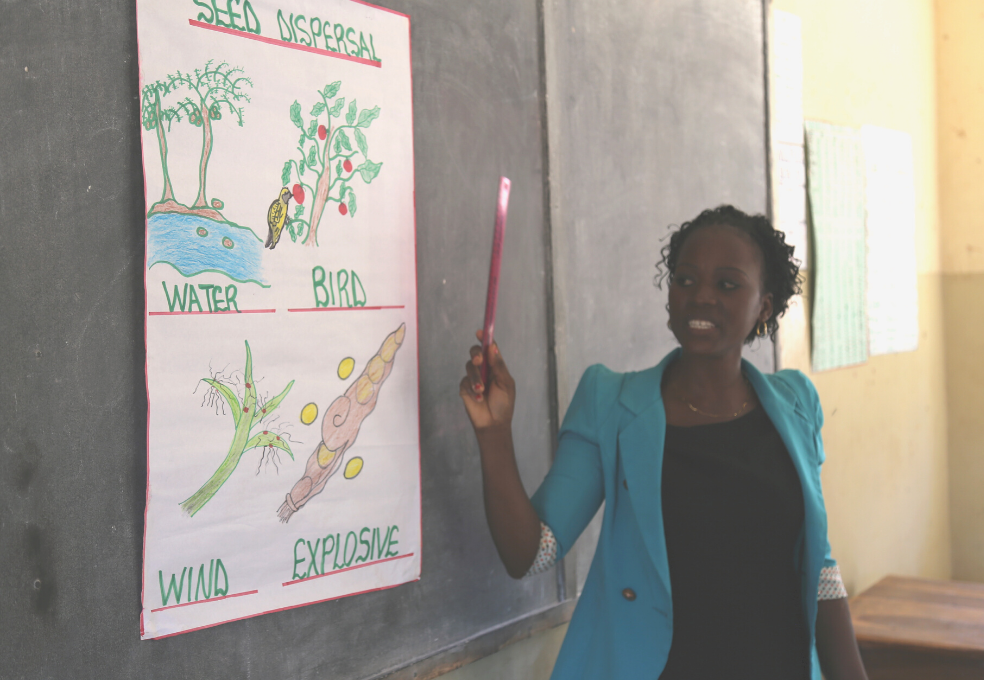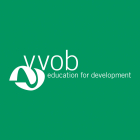The missing link in the COP strategy: teachers.
Discussion details
The UNFCCC-COP26 set out to be the moment to deliver on many earlier promises. The talks in Glasgow have birthed some initial commitments at macro-level on key issues such as forestation but the conclusions are overall received with disappointment of civil society and leading governments alike. Similarly, education did not receive much attention outside the corridors of the COP. This despite a call to action by the Global Partnership on Education and the recurrent rhetoric on the need for future-proof skills and behavior change for future generations.

Education on climate change is, even with young children as pupils, inherently complex; credits: VVOB
In COP-speak, education for sustainable development becomes Action for Climate Empowerment (ACE). In past years, many countries have urged their colleagues to join efforts to upgrade the quality and intensity of climate change education. In the background of the mediatized process towards COP26, countries did talk about a new framework for Climate change education, but left an essential missing link unresolved: support for teachers.
Teacher training is painfully absent from discourse and plans towards empowering citizens to take climate action.
Assuming teachers can simply pivot from traditional approaches and create a learning environment for children and youth that integrates all modern concepts of sustainability is a delusional version of optimism. As citizens, teachers have also lived, studied and worked within the dominant discourse that has led to the current situation of global crises.
Many teachers are eager to shift to actions and teaching that include the contemporary understanding of origins and consequences of climate change and to equip the learners with sets of skills they will need to cope with the impacts of it. Yet, teacher training is painfully absent from discourse and plans towards empowering citizens to take climate action.
Teachers are leading figures in their communities, they have a very strong impact on their students. The quality of teaching, by extension the quality of teacher training on offer, has a huge impact on what and how children learn. This is of particular relevance when looking at equity in learning outcomes. Spoiler alert: children with disadvantaged backgrounds suffer most if their teachers do not receive quality pre-service or in-service training.

Education on climate change requires strong teaching skills, a robust understanding of the challenge and a lot of creativity; credits: GPE/Alexandra Humme
Education on climate change is, even with young children as pupils, inherently complex. It requires strong teaching skills, a robust understanding of the challenge and a lot of creativity to transpose the complexity of the matter to a level the pupils can capture – their zone of proximal development. In other words: a teacher must first understand and digest a very complex, sometimes counter-intuitive issue before being able to offer it piecemeal to the students.
They deserve support in this critical endeavor. But teacher-training is rarely served the attention (and resources) it merits. There are encouraging examples of teachers cooperating within communities of practice locally, or on sharing platforms globally.
|
In South Africa, VVOB - education for development works to create a coherent policy environment in which the education sector is fully utilised as a strategic resource in the country's transition towards a more climate resilient society. Learn more about the Keep It Cool project on climate change education. |
VVOB – education for development accompanies the ministries of education in the DR Congo and Uganda to make agricultural and entrepreneurship education future proof. The organization also facilitates twinnings between schools that focus on climate action: an Ecuadorian and a Belgian technical school are testing options for biofuels from the possible adaptations to traditional engines to analysing the most sustainable, non-food sourcing.
Such peer learning works on two fronts simultaneously: it offers immediate solutions to students and local companies but it also helps shift the global perspectives of teachers and students to move away from the traditional helper-receiver relations.
|
On the S-COOL-LINKS platform, VVOB provides a space for discussion and resources for teachers interested in climate education. Through the School Links programme VVOB establishes equity-based partnerships between Belgian schools and schools in the Global South with the ambition to evolve in a sustainable way and to work together on a number of educational goals. |
Let’s not appease ourselves with such examples. However valuable, they must become structural if we want them to have an effect at global scale.
A paradigm-sift to open the eyes to possible shifts towards zero-emission practices should not be left to the inspiration of one or even many individual teachers. Rather, it should be approached at institutional level, including a global perspective on this truly global challenge. Teachers and teacher training institutes working together across borders can open the eyes to current and future generations of educators and, as such, have long-lasting impact on how society looks at climate change.
The COP26 has missed the opportunity to make a strong case for this. Organisations that support the education sector will keep pushing for more attention for the teaching profession and reasonable investment in the pre- and in-service training of teachers worldwide. But in the end, it will have to be the governments that must take action as the duty bearers of the right to education and many other rights that are at risk due to climate change such as the right to life, water and sanitation, food, health, housing, self-determination, culture and development.
Sven Rooms – General Director, VVOB – education for development

Comments
Log in with your EU Login account to post or comment on the platform.